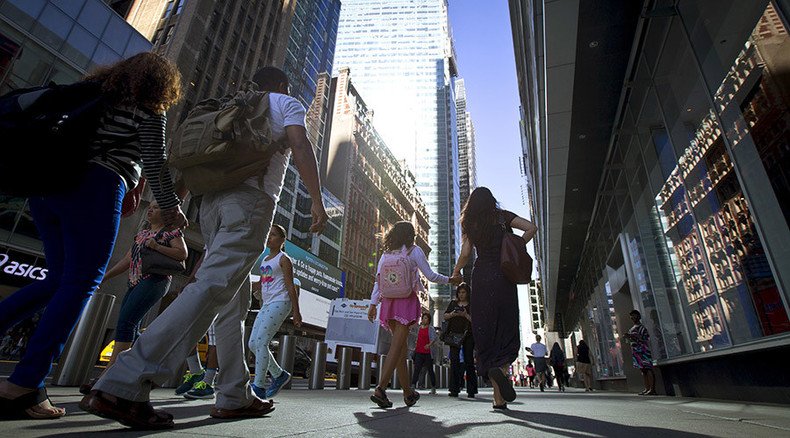'America is a bomb waiting to explode'

The United States is in decline. While not all major shocks to the system will be devastating, when the right one comes along, the outcome may be dramatic.
Not all explosives are the same. We all know you have to be careful with dynamite. Best to handle it gently and not smoke while you’re around it.
Semtex is different. You can drop it. You can throw it. You can put it in the fire. Nothing will happen. Nothing until you put the right detonator in it, that is.
To me, the US – and most of the supposedly free West – increasingly looks like a truck being systematically filled with Semtex.
READ MORE: 'US 2016 race: People sick of politics of personalities, want substantive debate'
But it’s easy to counter cries of alarm with the fact that the truck is stable – because it’s true: you can hurl more boxes into the back without any real danger. Absent the right detonator, it is no more dangerous than a truckload of mayonnaise.
But add the right detonator and you’re just one click away from complete devastation.
We can see how fragile the U.S. is now by considering just four tendencies.
1. Destruction of farms and reliable food source
The average American is a long way from food when the shops are closed.
The Washington Post reports that the number of farms in the country has fallen by some 4 million from more than 6 million in 1935 to roughly 2 million in 2012.
And according to the College of Agriculture & Life Sciences, only about 2 percent of the US population live on farms.
That means that around 4.6 million people currently have the means to feed themselves.
Food supply logistics are extended, sometimes stretching thousands of miles. The shops have nothing more than a few days’ stock. A simple break in that supply line would clear the shops out in days.

2. Weak economic system
The American economic system is little more than froth.
The US currency came off the gold standard in 1933 and severed any link with gold in 1971. Since then, the currency has been essentially linked to oil, the value of which has been protected and held together by wars.
The whole world has had enough of the US and its hubris – not least the people of the US themselves, which the massive support currently for Putin’s decision to deal with ISIS demonstrates.
Since pro-active war is what keeps the US going, if it loses the monopoly on that front, its decline is inevitable.
Fiat economies always collapse. They last on average for 37 years. By that metric the US should have already run out of gas.
Once people wake up and smell the Yuan, the Exodus out of the dollar will be unstoppable.

3. Americans increasingly on mind-altering drugs
According to the Scientific American, use of antidepressants among the US population was up 400 percent in the late 2000s over the 1990s. Many of these drugs are selective serotonin reuptake inhibitors.
These are the type of FDA-approved narcotics lone gunmen are frequently associated with, and their psychoses often attributed to a forced or sudden withdrawal from such drugs.
Pharmaceuticals are produced at centralized points by companies which themselves rely on extended logistics systems both to produce and to deliver their output. If the logistics system fails, there’s no more supply.
4. Morals in decline
During the objective hardship of the 1930s, there was surprisingly little crime. People were brought up with a conception of morals and right and wrong. Frugality and prudence were prized virtues. Communities were generally fairly cohesive.
Relative to then, society today is undisciplined, unrealistic and selfish.
Around 250 million shoppers participated in the Black Friday sales in 2013 in which around USD 61 billion was spent on consumer items – up roughly 100 percent on 2006 figures.
Stampedes and even murders are not uncommon each year with people openly fighting each other over reduced-price items.
The goods bought in such sales tend to be non-essential and many of them are bought on credit cards which then have to be paid off at interest.
Part of the problem in what I have outlined above is that there is little explicit tension. Sure, it is depressing, vulgar and immoral. But it doesn’t look catastrophic. It looks normal.
My point is that just because US – and many other countries organised after the same template – do not look explosive, doesn’t mean they won’t blow up.
Whereas 80 years ago we could absorb major shocks, today we cannot.

Nowhere to run
In the past, people were in rural communities. They could grow food. They had real communities. They also had self-control and a conception of morality.
Today, if the supply lines go down, you are stuck in a house you can’t heat surrounded by millions of FDA-approved drug addicts who are going psycho because they have run out of juice and people who would murder their own grandmother to get a cut-price iPhone.
I would argue that the right shock event – or combination of shock events – will detonate the explosive.
Potential detonators happen all the time. Either they are contained or they are simply incompatible with the explosive or they don’t go off. But that doesn’t mean it’s never going to happen or that we are not sitting on a mountain of explosives.
There was one such potential detonator – which presently has not gone off – in the UK just last week.
The UK’s Independent reported Friday that experts were ‘staggered’ after Pauline Cafferkey – who had been brought to London of all places – rapidly declined after being declared cured from Ebola.
This woman had been allowed out into the community – still sick with Ebola – and managed to visited Mossneuk Primary School in East Kilbride, South Lanarkshire, on Monday to thank children for their fund-raising efforts.
We will assume these events have their origins in incompetence; the fact is: we have a woman dying from Ebola in the UK’s largest population center.
What if there is more incompetence?
Boris Johnson, the current Mayor of London, primed the British public for the possibility of Ebola in London just last week.
Perhaps he knows something we don’t.
What do you think will happen if people start dying from Ebola in London or New York? The natural response will be to get out of the urban centre as quickly as possible.

During the Great Plague of London of 1665, for example, Defoe wrote "Nothing was to be seen but wagons and carts, with goods, women, servants, children, coaches filled with people of the better sort, and horsemen attending them, and all hurrying away".
Once the better off city people reach the countryside there will be instant resistance from the host population, not least because they will not want potentially infected people entering their communities.
Meanwhile, the poor people who are left in the cities will run out of food in short order as suppliers refuse to enter the city.
Those who fled London in 1665 had somewhere to go: they were returning to the fields that fed them.
Today, the fields which feed us are largely in other countries, and the ones which are in our own are mainly owned by large corporations.
I am not predicting exactly this scenario for the US or for any other country. I am saying that all the ingredients are there for complete breakdown and large-scale deaths given the right initiating incident.
I am saying that volatility is baked into the cake – even into the cake of what today looks and feels normal.
I am saying that while it may be possible to keep loading box upon box of societal Semtex into the truck, given the right detonator the collapse will be swift, unstoppable and devastating.
The statements, views and opinions expressed in this column are solely those of the author and do not necessarily represent those of RT.













